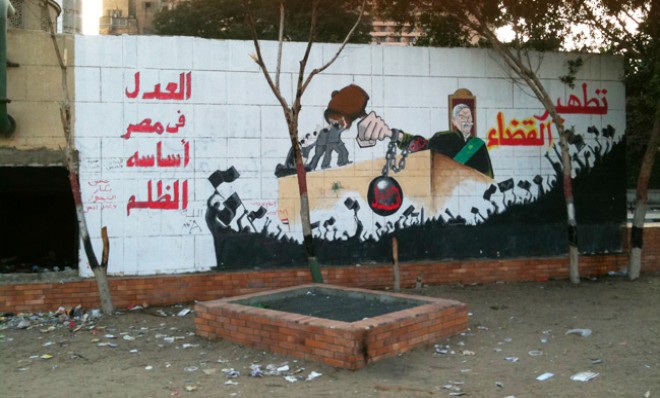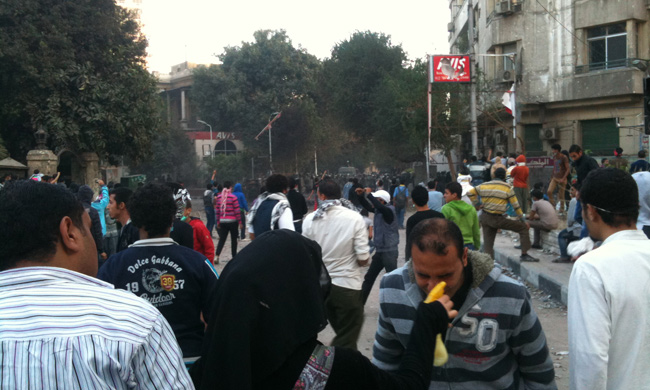Dispatch from Cairo: What's really happening in Tahrir Square
Egypt's secularists, unable to counter the Muslim Brotherhood's impressively powerful political machine, are turning increasingly violent

A free daily email with the biggest news stories of the day – and the best features from TheWeek.com
You are now subscribed
Your newsletter sign-up was successful
CAIRO, EGYPT — Since last week, a huge sit-in has once again engulfed Tahrir Square. The demonstration — and the bloody, peripheral street battles — have shut down much of downtown Cairo.
The protests have been organized by the disparate groups that make up the Egyptian left. These groups are tenuously unified by a broad commitment to secularism and opposition to the current Islamist government.
Ostensibly, the protests are in response to a unilateral decree by Islamist President Mohamed Morsi that dismissed the high courts, a move which gives Morsi both executive and judicial power.
The Week
Escape your echo chamber. Get the facts behind the news, plus analysis from multiple perspectives.

Sign up for The Week's Free Newsletters
From our morning news briefing to a weekly Good News Newsletter, get the best of The Week delivered directly to your inbox.
From our morning news briefing to a weekly Good News Newsletter, get the best of The Week delivered directly to your inbox.
However, the judiciary is nearly universally unpopular here. Appointed by the old dictatorship, these old-guard judges have been trying to dissolve the elected parliament and have refused to seriously prosecute police and soldiers who massacred protesters during the revolution over the last two years.
While Morsi's decree represents a massive expansion of presidential power, his supporters argue that is is simply a temporary solution to deal with the judiciary — an undemocratic remnant of the hated dictatorship. And indeed, most of the protesters now in Tahrir also despise the judges. The secular protesters have, in the past, demonstrated against these very judges, with members of Morsi's Islamist faction at their side.
So what is the true cause of the latest round of political clashes? It has less to do with a dispute between the executive and judiciary branches, and everything to do with unresolved issues from the elections of several months ago. The losing secularists insist that they weren't given a fair shake.

Of course, the secularist political organizations here are notoriously fractured and disorganized, which partly accounts for their poor electoral showing. Among the secularists are such disparate elements as remnants of the old dictatorship still desperately trying to cling to power, and the revolutionaries who formed the vanguard of last year’s revolution, and now want to lead Egypt on a path to secular, social democracy.
A free daily email with the biggest news stories of the day – and the best features from TheWeek.com
Not surprisingly these two groups view each other with open distrust, and have paid a high price politically for this.
In the Egyptian presidential runoff election, Morsi narrowly defeated Ahmed Shafik, a man who is a committed secularist and former prime minister under Hosni Mubarak. Even with many revolutionaries boycotting the election, Shafik still managed to get 48 percent of the vote.
But in a presidential runoff, 48 percent is as good as 0. Shafik lost, and Morsi won. And in the equally important parliamentary elections, the secularist parties collectively scored only a quarter of the vote. Sympathetic voters were demoralized by constant infighting, and unmotivated by a movement which lacked the grassroots ground-game to get out the vote.
The fallout of this embarrassment is deepened by the stinging fact that this session of parliament is rewriting the constitution, effectively setting the political rules for the foreseeable future.
The secularists have no one to blame but themselves. But many of them still feel that the current government does not represent the true will of the people, and are terrified that an illegitimate Islamist government will betray the revolution and install a theocracy.
For their part, the Islamist parties are considerably more organized than the the leftist opposition, but are also divided into two factions, the centrist Muslim Brotherhood and the radical Salifi Bloc
While the Muslim Brotherhood advocates policies guided by broad, inclusive Islamic principles, the Salifis embody everything that we in the West associate with radical political Islam. They want to strip women of the right to vote and institute harsh social laws reminiscent of Saudi Arabia. Even in conservative Egypt these views are unpopular. However, it's an open secret that the Salifis get substantial funding from wealthy donors in Saudi Arabia and elsewhere. They have allegedly used this money to build a broad political network and allegedly bribe voters. In the end, they won a whopping 25 percent of the parliamentary vote.
The venerable Muslim Brotherhood is a much different organization. They are one of the oldest modern Islamist groups in the world and emphasize Islamic ideals like charity and collective responsibility instead of advocating harsh shariah. Besides politics, the MB also runs free hospitals and other charitable services in Egypt's many poor communities.
The MB institutions are reputed to be far superior to the often nightmarish public services offered by the government, and this has won them the respect of a wide swath of Egyptian society.
Despite agitating for democracy and being officially banned by Mubarak's dictatorship, unofficially, the Muslim Brotherhood has long been generally tolerated, if only for the simple fact that the regime relied on them to pick up the slack and provide social assistance that government couldn’t or wouldn’t. Today, that combination of historical resistance, extensive social programs, and a decades-old grassroots network make the MB a formidable political machine.
While secularist parties were demoralizing their constituencies with infighting, the MB used their extensive grassroots network to relay a simple message: We helped Egyptians in the past, and we will continue to help if you vote for our candidates. It worked, and the MB parties now control around 50 percent of the Egyptian parliament, giving them a massive plurality.

Despite ideological differences, the Salifis supported the MB in the final presidential election and are supporting them in this current crisis.
In fact, instead of getting the MB to moderate their approach, Cairo's increasingly violent secular protests might have the opposite effect, and drive Muslim Brotherhood backers further into the arms of the Salifis.
With at least two leftists already killed by police and one teenage MB member murdered by an angry mob, partisans on both sides are girding for a long, bloody fight.
Most unaffiliated Egyptians across the political spectrum are fed up with this conflict. Despite widespread concern about Morsi’s declaration and suspicions about the MB in general, the leftists are increasingly seen as irresponsible thugs who can organize disruptive street fights but not much else. Most Egyptians just want the factions to get past this and fix Egypt’s myriad social problems.
Jake Lippincott earned a degree in Middle Eastern Studies at Hampshire College. He worked in Tunis during the popular uprising there, and is now based in Cairo.
Jake Lippincott earned a degree in Middle Eastern Studies at Hampshire College. He worked in Tunis during the popular uprising there, and is now based in Cairo.